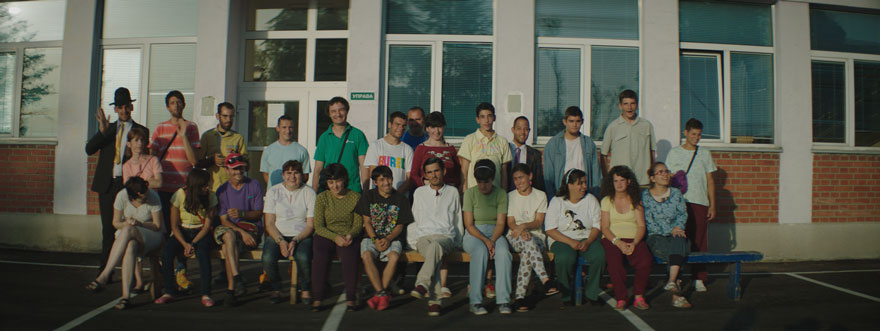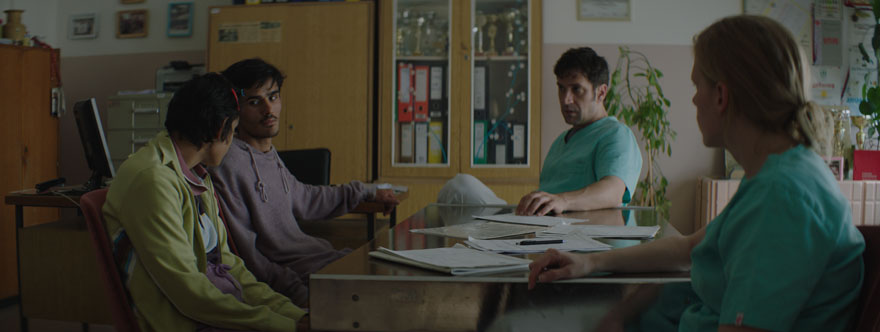OAZA/OASIS, interview with Ivan Ikić
Giornate degli autori
Ivan Ikić, winner of the Europa Cinemas Label: “We need a new wave of ideas on how we re-socialize people with intellectual disabilities”

The film is set in an existing facility for people with mental disabilities, where both Marija (Marijana Novakov) and Dragana (Tijana Markovic) fall in love with Robert (Valentino Zenuni). This leads to an authentic portrayal of a love triangle, which is both honest and desperate. The shooting that led to this touching piece of cinema was, in Ikić’s words, not at all by the book since there was no such book made available through film history. Ideally, this conversation would have taken place in Venice, but, instead it was held in a virtual and safe stretched out point between Ireland, Belgium and Serbia.
You have said in previous interviews that you first got the inspiration from a documentary you made in the same institution during your film school days. What led you to pour this idea into a fictional film?
The first time I actually had heard the story about the love triangle, was in the institution. I spent a lot of time there, and met many people, so I know that world very well. But, I had no ambition to make a feature film about it. It stayed somewhere in my mind and I did not know what to do with it. In 2016, I realised I could make this kind of formal structure of the story with three different perspectives, and that became the key to how I wanted to tell the story.
The structure you talk about suggests the film was heavily scripted. Was there any space for improvisation?
These kinds of stories need to be very precisely scripted. You do not have much space for improvisation in the storyline, but you can make some changes in the scenes. 90% of what I wrote is in the film. I felt during the first days of shooting that improvisation was a road to nowhere and if we would open that Pandora’s box, we would just lose time and not get any qualitative results out of it. Even the actors feel that when they know exactly what they need to do, they are very secure in that environment and they can express their emotions accordingly. If we change a scene all the time, the actors feel very insecure which causes their emotions to be inconsistent in that scene.
You made the bold choice of working with non-professional actors for this film. What was the greatest challenge?
My initial idea was to find the cast in the real institutions, to play those same characters which I had written. So since the beginning that was the greatest challenge for me, to find the characters, to find the people and to improve their acting skills to the level where they can play the fictional characters. Since I could not find a similar experience in the history of cinema, somebody else who had tried to do the same thing with people with special needs, I could not rely on any previous experience. In that sense it was also a directorial challenge because again there is no book about it, no previous experience. I tried to experiment, to find out how to apply everything we know about the technique of acting to the people who have never acted before, and who are living in institutions [like in Oasis] and have intellectual disabilities.

Did that lead to any surprises in terms of casting?
In the workshops, we were able to crystalize who was perfect for each role. When we started the process, the girl who plays Marija (Marijana Novakov) was not our favourite at all for that role. But she was so good during the workshop, and she improved so much, that she was marvellous at the end.
Can you guide us a bit through your experimental process of directing them?
People with intellectual disabilities, have been told all their lives that they are not good enough, that they cannot improve, but [Oasis] allowed them to feel like they were improving, which helped build trust and courage.
In what way did the environment you were shooting in, the institution, influence the shooting process?
It was a problem because you need to stick to the rules of the institution: when are they waking up, when do they have to eat… When we would start working on a scene, one of them would have to go to have lunch, which broke the atmosphere of the scene completely. Therefore, we would do that scene over again tomorrow. I would say it was extreme filmmaking because it was nothing like by the book. The schedule was a complete mess from the beginning. The whole crew was very unhappy about it, especially production.
You made the choice to show some very graphic self-harm scenes, which plays a big role in the film. It almost becomes a character. What led to this decision, and the decision to show it so graphically?
I feel that in self-harm, there is something poetic. You are trying to push your body to the limits where you can feel alive. I feel that it is graphic, but the way I portrayed it, should make you feel more like a way to reclaim their identity. I think we composed those shots and we did the mise-en-scene that the audience should be aware that it is very dangerous but also very important for the characters, that is their way of expressing their emotion.
Because of the love theme and the very extreme response to it, it is tempting to classify this film as a coming of age, but should we?
The characters in the film are 24-25. This is misjudged by most of the people. Most of them feel they are teenagers. But they are not. Many people will perceive it that way and I am aware of that. For me the story is even more tragic if they are not considered as teenagers but as young adults. It is not a question of identity anymore but of biology. You are not a kid anymore. But if you have a disability you are treated as one. That was something very interesting to me. Also, coming of age feels to me like a brand that comes from the American cinema.

Has this experience inspired the cast to pursue more acting or creative endeavors?
They have completely different ideas about their lives. Their wishes are very realistic. Marija, for example, wants to be an auto mechanic. That is what she really wants to be, she likes acting but it is not something she wants to do for life. So that is something we are working on, to find her a proper education about auto mechanics. And Robert (Valentino Zenuni), wants to go into photography. So during the shooting of the film, he was also shooting us!
OASIS opens with propaganda archive footage that you found in the institution where the film was shot. This creates a valuable contrast of the past with the present of your film. In what manner do you think it can influence the way these institutions work and are developed in the future?
Do I feel like this film could start the broader change in the institutionalization of people with mental disabilities? I think it can on some level because I feel that the system itself, like the government and even the institutions themselves and the people who work there, is very aware of the fact that it does not work and that it should be changed. It is some kind of lost place on earth from a former time. They need the help of strong public pressure, though, as an initial push for the change. We need a new wave of ideas on how we resocialize people with intellectual disabilities who do not have any connection to their families.
So, can we then assume that you are a fierce believer in the political power of cinema?
That is too big of a conclusion! This idea of cinema changing the world comes from the sixties and after ’68 even the guys from the sixties realized that it is impossible and became completely disillusioned. The ones that do pretend so only do so to gain more money and get attention. Cinema does have some kind of strange power which is to change the people in the audience. That is very important. Maybe it does not change society, but it changes people.
How did you get funding for this film? Was it difficult, given the subject matter?
This film was a complete niche from the beginning. (Laughs) The producers who were just trying to make some money said “no” because it was not set out to become a business success. But then we found some film funds that considered this kind of film should be made and it was not expensive. We were lucky because we got money in Serbia, the Netherlands, and Slovenia. Even if it was a failure, it was an affordable failure. (Laughs)

In what way was the cast included in the new steps the film takes? Were they, for example, informed that the film won the Europa Cinemas Label?
They are informed, of course! We were very unhappy, though, that they could not attend the premiere in Venice and not experience first-hand that what they did has some broader impact. They are now doubly isolated: there is the isolation of our country regarding travelling and there is the isolation of the institution because they have very strict rules due to COVID-19. It is a very vulnerable place.
How important is it for you as the director that Oasis has a theatrical release and is experienced by viewers as an audience, rather than alone at home?
In the cinema, the focus of the audience is completely on the film. You can walk out of the cinema, but if you have already spent time getting to the cinema and buying your ticket, you are going to give more effort to understanding the film on the screen, you will not give up as easily as opposed to a film on a streaming service. The theatre changes the language of cinema in a film. When you are watching a film on a small screen, your phone or laptop, a completely different language of cinema can work. And it is a banal language, I must say. But in the cinema, you can see more complex ways of making films, more complex cinema language. It fundamentally changes the perspective of how we watch films.
Considering these very confusing times we live in at the moment, what is the best-case scenario you wish for your film?
What I wish is for the film to be present at many festivals and to be screened in a lot of cinemas. I feel that this madness of online screenings will disappear soon and we will remember it as a bad dream. I hope we will all go back to the cinemas to watch films in the old-fashioned way. That is ultimately what I wish for my film: to be experienced in the cinema. Even with the limited access we have now and the masks. Whatever the rules are, it is still a much better experience than any other consumption of the film.
_____
Bo Alfaro Decreton – Belgium
Mia Sherry – Ireland
(Photo credits : Milos Jacimovic)
_____
Bo Alfaro Decreton and Mia Sherry, were members of the Giornate degli Autori jury and each represented Sphinx Cinema (Belgium) and Irish Film Institute (Ireland) within the frame of 27 Times Cinema initiative.
